Oil Industry Impact on Niger Delta
VerifiedAdded on 2020/05/28
|20
|4295
|34
AI Summary
This research assignment delves into the detrimental consequences of the oil industry on the Niger Delta region of Nigeria. The study analyzes the multifaceted issues arising from oil exploration and production, focusing on environmental degradation, pollution of air, water, and soil, and the escalation of social conflicts. It also investigates the economic disparities and challenges faced by local communities due to the dominance of the oil sector.
Contribute Materials
Your contribution can guide someone’s learning journey. Share your
documents today.
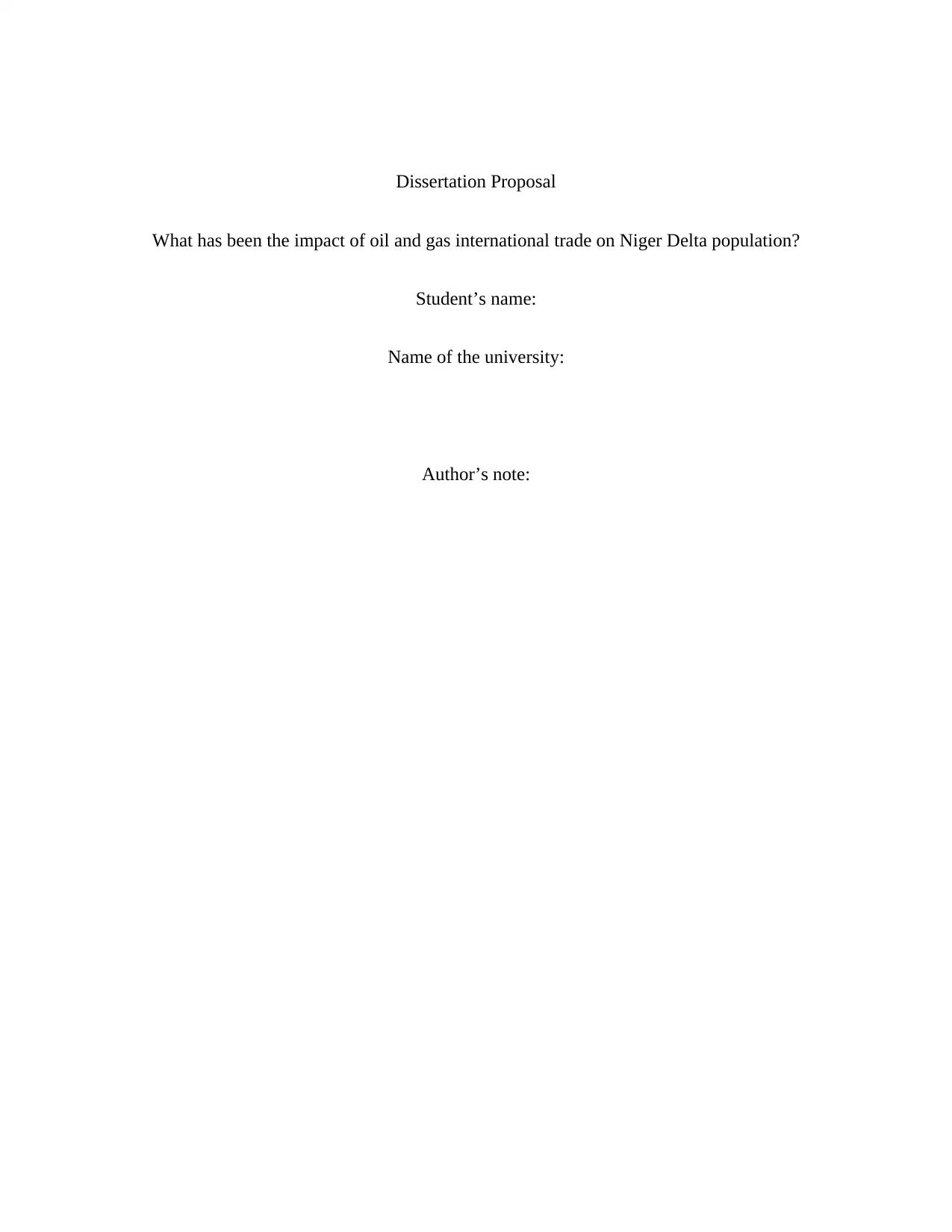
Dissertation Proposal
What has been the impact of oil and gas international trade on Niger Delta population?
Student’s name:
Name of the university:
Author’s note:
What has been the impact of oil and gas international trade on Niger Delta population?
Student’s name:
Name of the university:
Author’s note:
Secure Best Marks with AI Grader
Need help grading? Try our AI Grader for instant feedback on your assignments.
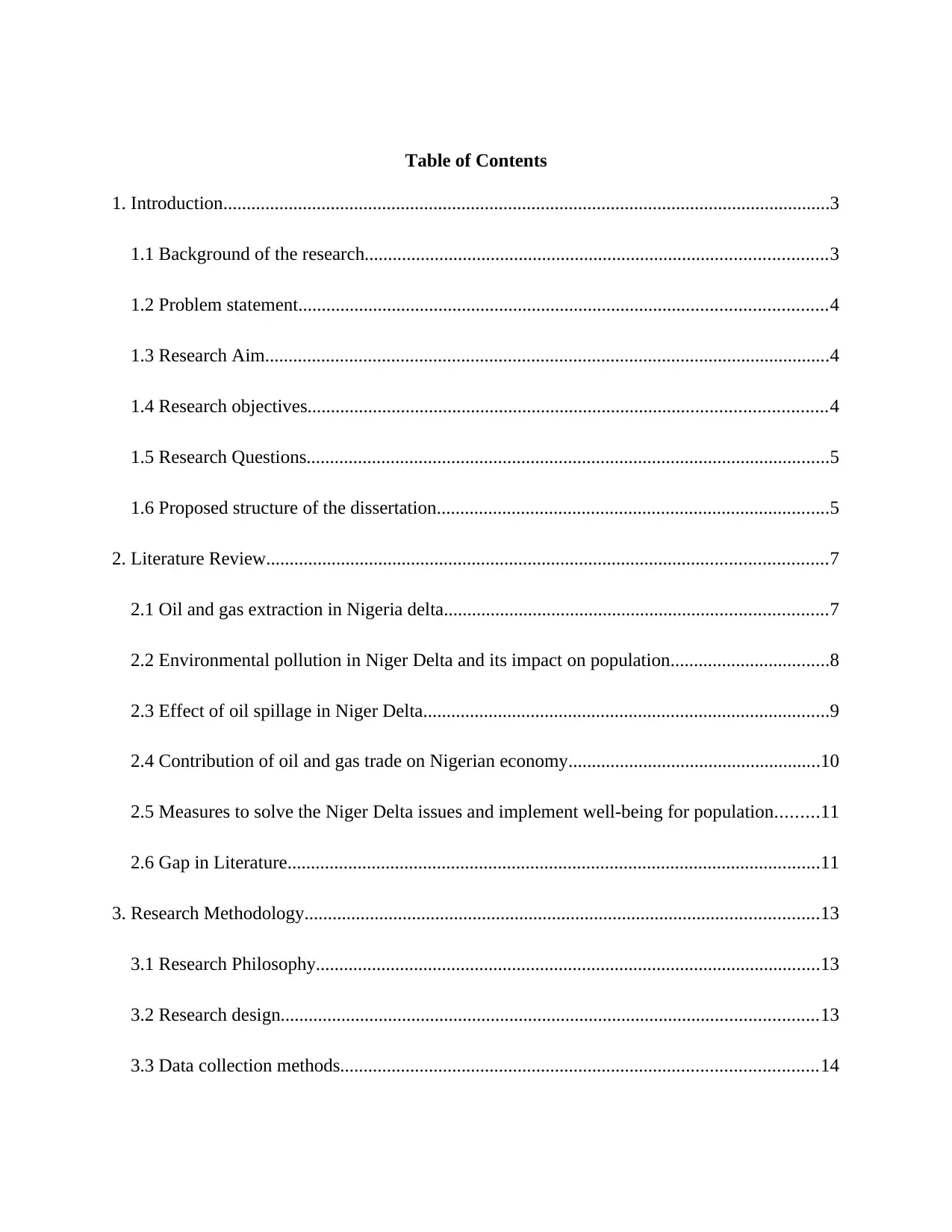
Table of Contents
1. Introduction..................................................................................................................................3
1.1 Background of the research...................................................................................................3
1.2 Problem statement.................................................................................................................4
1.3 Research Aim.........................................................................................................................4
1.4 Research objectives...............................................................................................................4
1.5 Research Questions................................................................................................................5
1.6 Proposed structure of the dissertation....................................................................................5
2. Literature Review........................................................................................................................7
2.1 Oil and gas extraction in Nigeria delta..................................................................................7
2.2 Environmental pollution in Niger Delta and its impact on population..................................8
2.3 Effect of oil spillage in Niger Delta.......................................................................................9
2.4 Contribution of oil and gas trade on Nigerian economy......................................................10
2.5 Measures to solve the Niger Delta issues and implement well-being for population.........11
2.6 Gap in Literature..................................................................................................................11
3. Research Methodology..............................................................................................................13
3.1 Research Philosophy............................................................................................................13
3.2 Research design...................................................................................................................13
3.3 Data collection methods......................................................................................................14
1. Introduction..................................................................................................................................3
1.1 Background of the research...................................................................................................3
1.2 Problem statement.................................................................................................................4
1.3 Research Aim.........................................................................................................................4
1.4 Research objectives...............................................................................................................4
1.5 Research Questions................................................................................................................5
1.6 Proposed structure of the dissertation....................................................................................5
2. Literature Review........................................................................................................................7
2.1 Oil and gas extraction in Nigeria delta..................................................................................7
2.2 Environmental pollution in Niger Delta and its impact on population..................................8
2.3 Effect of oil spillage in Niger Delta.......................................................................................9
2.4 Contribution of oil and gas trade on Nigerian economy......................................................10
2.5 Measures to solve the Niger Delta issues and implement well-being for population.........11
2.6 Gap in Literature..................................................................................................................11
3. Research Methodology..............................................................................................................13
3.1 Research Philosophy............................................................................................................13
3.2 Research design...................................................................................................................13
3.3 Data collection methods......................................................................................................14
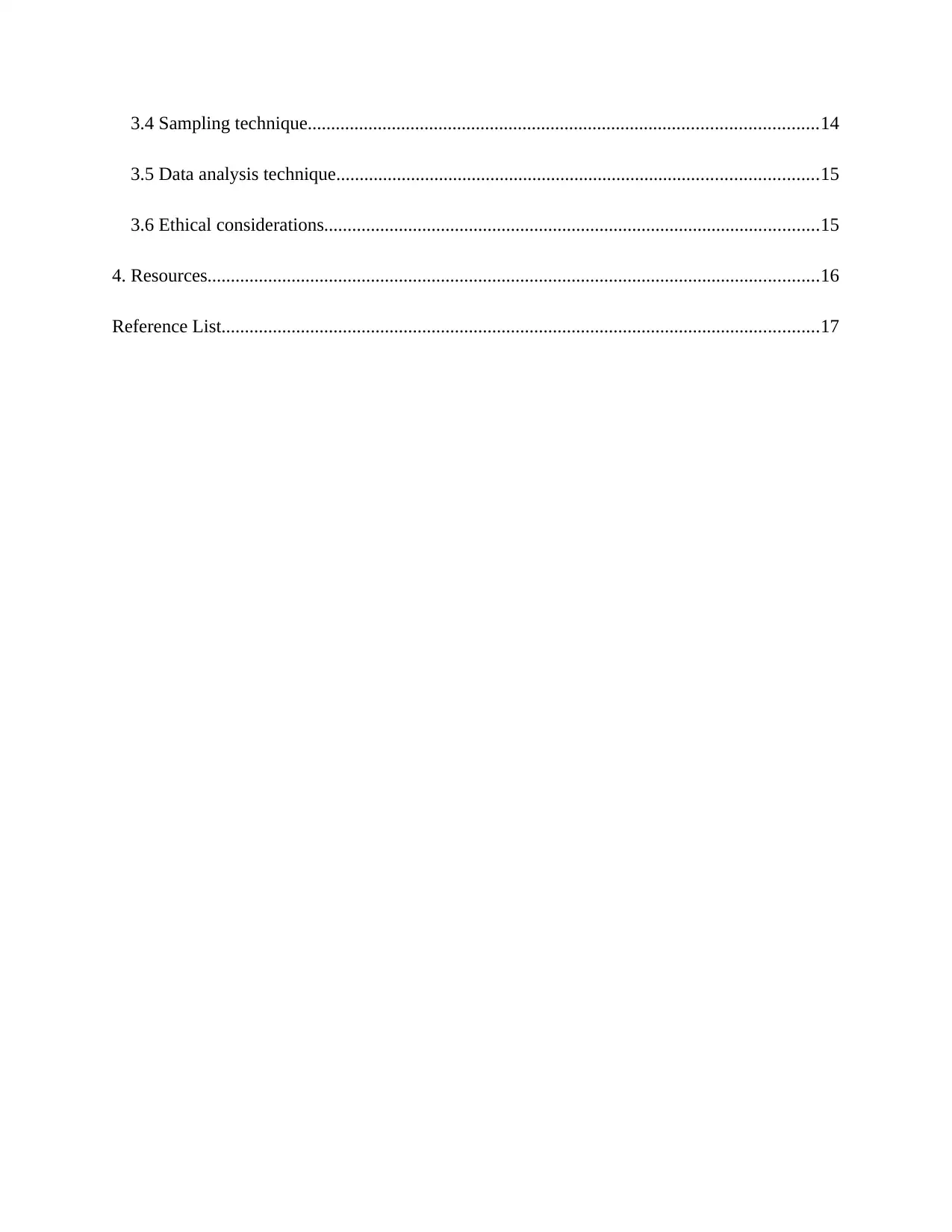
3.4 Sampling technique.............................................................................................................14
3.5 Data analysis technique.......................................................................................................15
3.6 Ethical considerations..........................................................................................................15
4. Resources...................................................................................................................................16
Reference List................................................................................................................................17
3.5 Data analysis technique.......................................................................................................15
3.6 Ethical considerations..........................................................................................................15
4. Resources...................................................................................................................................16
Reference List................................................................................................................................17
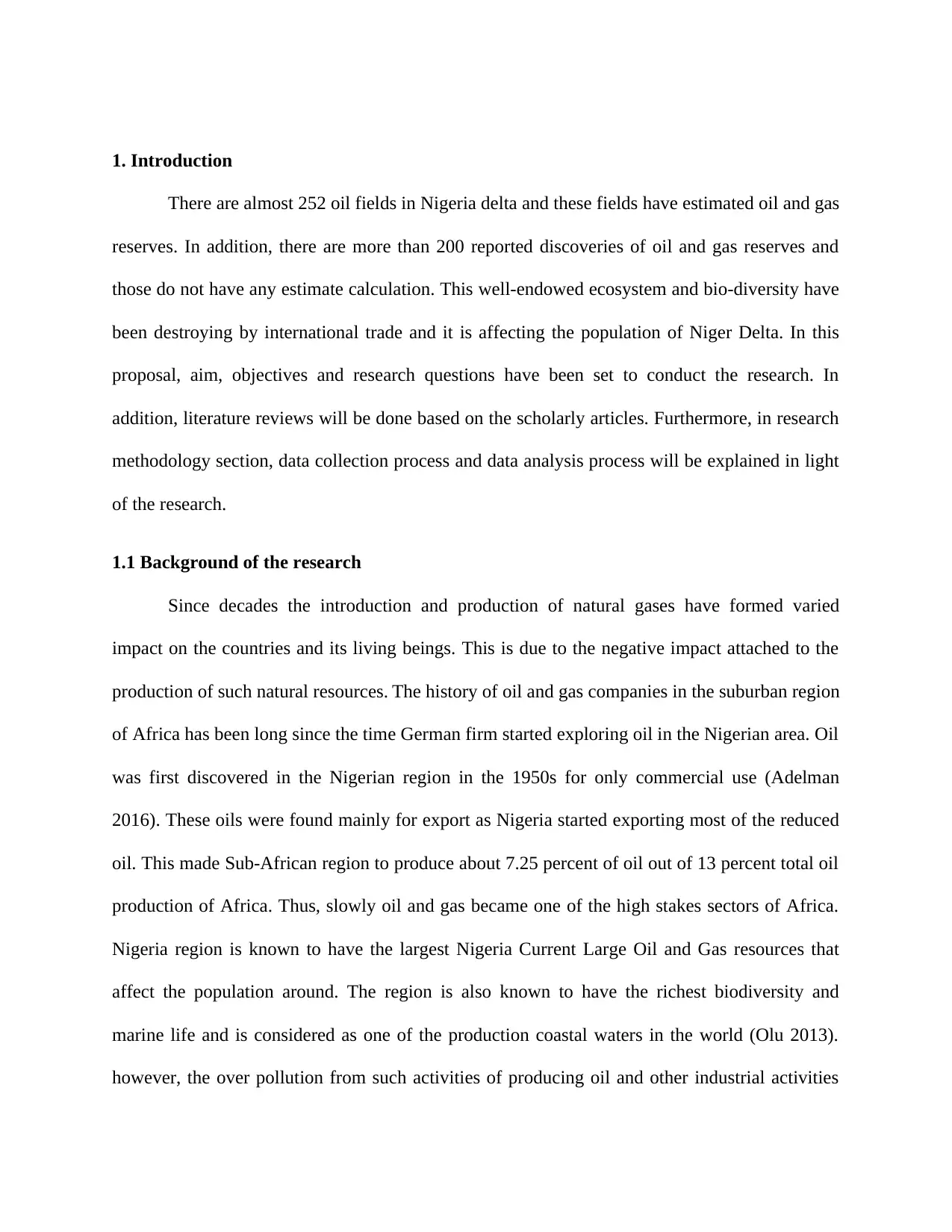
1. Introduction
There are almost 252 oil fields in Nigeria delta and these fields have estimated oil and gas
reserves. In addition, there are more than 200 reported discoveries of oil and gas reserves and
those do not have any estimate calculation. This well-endowed ecosystem and bio-diversity have
been destroying by international trade and it is affecting the population of Niger Delta. In this
proposal, aim, objectives and research questions have been set to conduct the research. In
addition, literature reviews will be done based on the scholarly articles. Furthermore, in research
methodology section, data collection process and data analysis process will be explained in light
of the research.
1.1 Background of the research
Since decades the introduction and production of natural gases have formed varied
impact on the countries and its living beings. This is due to the negative impact attached to the
production of such natural resources. The history of oil and gas companies in the suburban region
of Africa has been long since the time German firm started exploring oil in the Nigerian area. Oil
was first discovered in the Nigerian region in the 1950s for only commercial use (Adelman
2016). These oils were found mainly for export as Nigeria started exporting most of the reduced
oil. This made Sub-African region to produce about 7.25 percent of oil out of 13 percent total oil
production of Africa. Thus, slowly oil and gas became one of the high stakes sectors of Africa.
Nigeria region is known to have the largest Nigeria Current Large Oil and Gas resources that
affect the population around. The region is also known to have the richest biodiversity and
marine life and is considered as one of the production coastal waters in the world (Olu 2013).
however, the over pollution from such activities of producing oil and other industrial activities
There are almost 252 oil fields in Nigeria delta and these fields have estimated oil and gas
reserves. In addition, there are more than 200 reported discoveries of oil and gas reserves and
those do not have any estimate calculation. This well-endowed ecosystem and bio-diversity have
been destroying by international trade and it is affecting the population of Niger Delta. In this
proposal, aim, objectives and research questions have been set to conduct the research. In
addition, literature reviews will be done based on the scholarly articles. Furthermore, in research
methodology section, data collection process and data analysis process will be explained in light
of the research.
1.1 Background of the research
Since decades the introduction and production of natural gases have formed varied
impact on the countries and its living beings. This is due to the negative impact attached to the
production of such natural resources. The history of oil and gas companies in the suburban region
of Africa has been long since the time German firm started exploring oil in the Nigerian area. Oil
was first discovered in the Nigerian region in the 1950s for only commercial use (Adelman
2016). These oils were found mainly for export as Nigeria started exporting most of the reduced
oil. This made Sub-African region to produce about 7.25 percent of oil out of 13 percent total oil
production of Africa. Thus, slowly oil and gas became one of the high stakes sectors of Africa.
Nigeria region is known to have the largest Nigeria Current Large Oil and Gas resources that
affect the population around. The region is also known to have the richest biodiversity and
marine life and is considered as one of the production coastal waters in the world (Olu 2013).
however, the over pollution from such activities of producing oil and other industrial activities
Secure Best Marks with AI Grader
Need help grading? Try our AI Grader for instant feedback on your assignments.
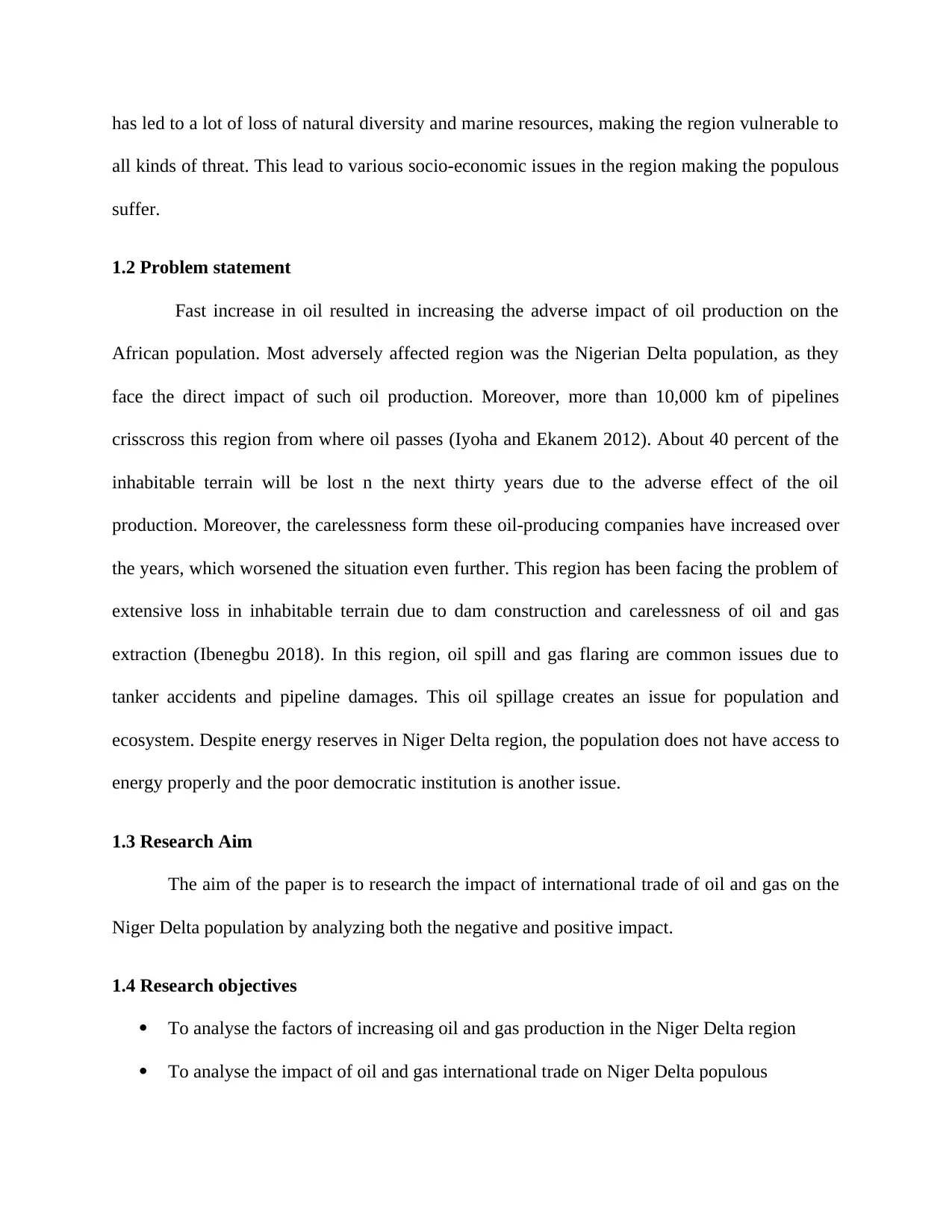
has led to a lot of loss of natural diversity and marine resources, making the region vulnerable to
all kinds of threat. This lead to various socio-economic issues in the region making the populous
suffer.
1.2 Problem statement
Fast increase in oil resulted in increasing the adverse impact of oil production on the
African population. Most adversely affected region was the Nigerian Delta population, as they
face the direct impact of such oil production. Moreover, more than 10,000 km of pipelines
crisscross this region from where oil passes (Iyoha and Ekanem 2012). About 40 percent of the
inhabitable terrain will be lost n the next thirty years due to the adverse effect of the oil
production. Moreover, the carelessness form these oil-producing companies have increased over
the years, which worsened the situation even further. This region has been facing the problem of
extensive loss in inhabitable terrain due to dam construction and carelessness of oil and gas
extraction (Ibenegbu 2018). In this region, oil spill and gas flaring are common issues due to
tanker accidents and pipeline damages. This oil spillage creates an issue for population and
ecosystem. Despite energy reserves in Niger Delta region, the population does not have access to
energy properly and the poor democratic institution is another issue.
1.3 Research Aim
The aim of the paper is to research the impact of international trade of oil and gas on the
Niger Delta population by analyzing both the negative and positive impact.
1.4 Research objectives
To analyse the factors of increasing oil and gas production in the Niger Delta region
To analyse the impact of oil and gas international trade on Niger Delta populous
all kinds of threat. This lead to various socio-economic issues in the region making the populous
suffer.
1.2 Problem statement
Fast increase in oil resulted in increasing the adverse impact of oil production on the
African population. Most adversely affected region was the Nigerian Delta population, as they
face the direct impact of such oil production. Moreover, more than 10,000 km of pipelines
crisscross this region from where oil passes (Iyoha and Ekanem 2012). About 40 percent of the
inhabitable terrain will be lost n the next thirty years due to the adverse effect of the oil
production. Moreover, the carelessness form these oil-producing companies have increased over
the years, which worsened the situation even further. This region has been facing the problem of
extensive loss in inhabitable terrain due to dam construction and carelessness of oil and gas
extraction (Ibenegbu 2018). In this region, oil spill and gas flaring are common issues due to
tanker accidents and pipeline damages. This oil spillage creates an issue for population and
ecosystem. Despite energy reserves in Niger Delta region, the population does not have access to
energy properly and the poor democratic institution is another issue.
1.3 Research Aim
The aim of the paper is to research the impact of international trade of oil and gas on the
Niger Delta population by analyzing both the negative and positive impact.
1.4 Research objectives
To analyse the factors of increasing oil and gas production in the Niger Delta region
To analyse the impact of oil and gas international trade on Niger Delta populous
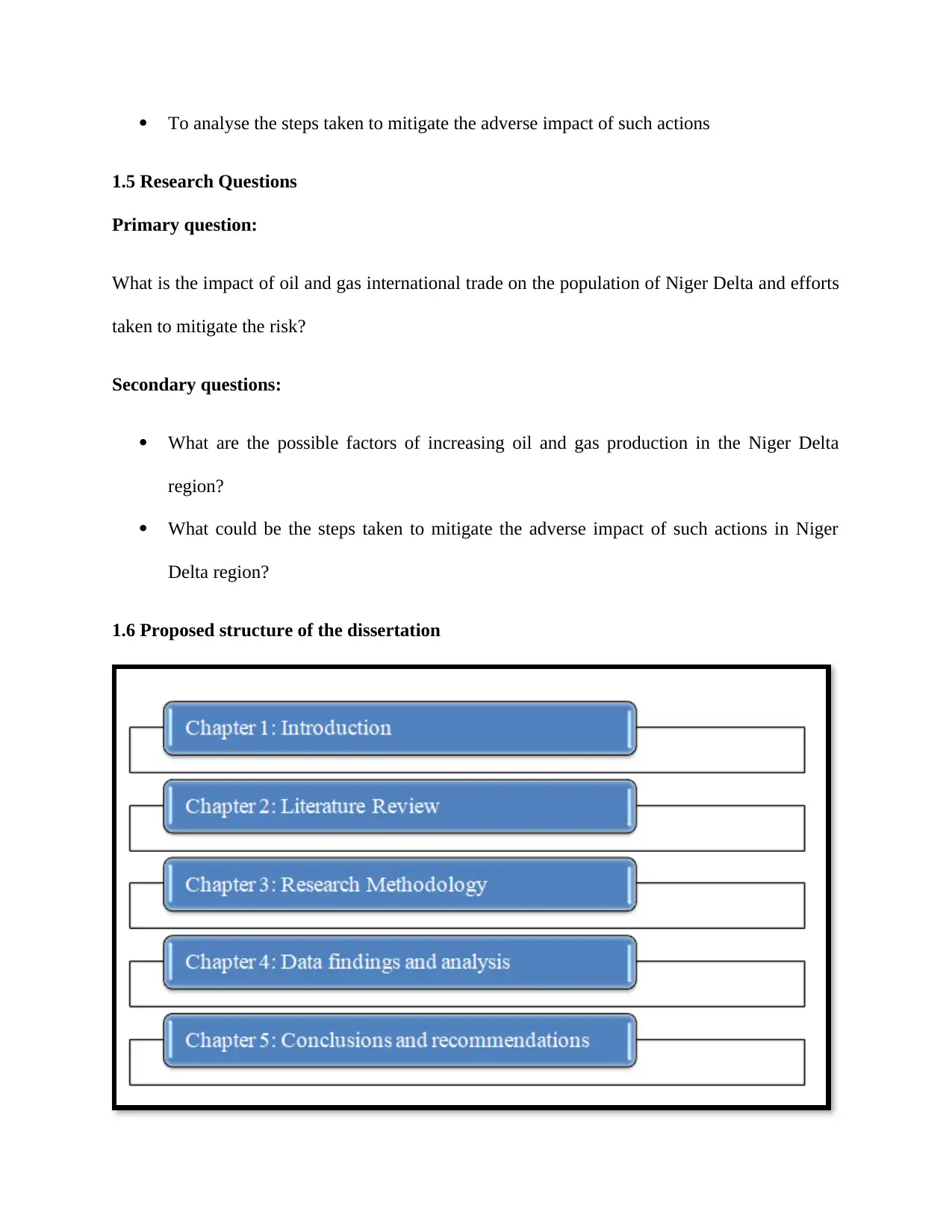
To analyse the steps taken to mitigate the adverse impact of such actions
1.5 Research Questions
Primary question:
What is the impact of oil and gas international trade on the population of Niger Delta and efforts
taken to mitigate the risk?
Secondary questions:
What are the possible factors of increasing oil and gas production in the Niger Delta
region?
What could be the steps taken to mitigate the adverse impact of such actions in Niger
Delta region?
1.6 Proposed structure of the dissertation
1.5 Research Questions
Primary question:
What is the impact of oil and gas international trade on the population of Niger Delta and efforts
taken to mitigate the risk?
Secondary questions:
What are the possible factors of increasing oil and gas production in the Niger Delta
region?
What could be the steps taken to mitigate the adverse impact of such actions in Niger
Delta region?
1.6 Proposed structure of the dissertation
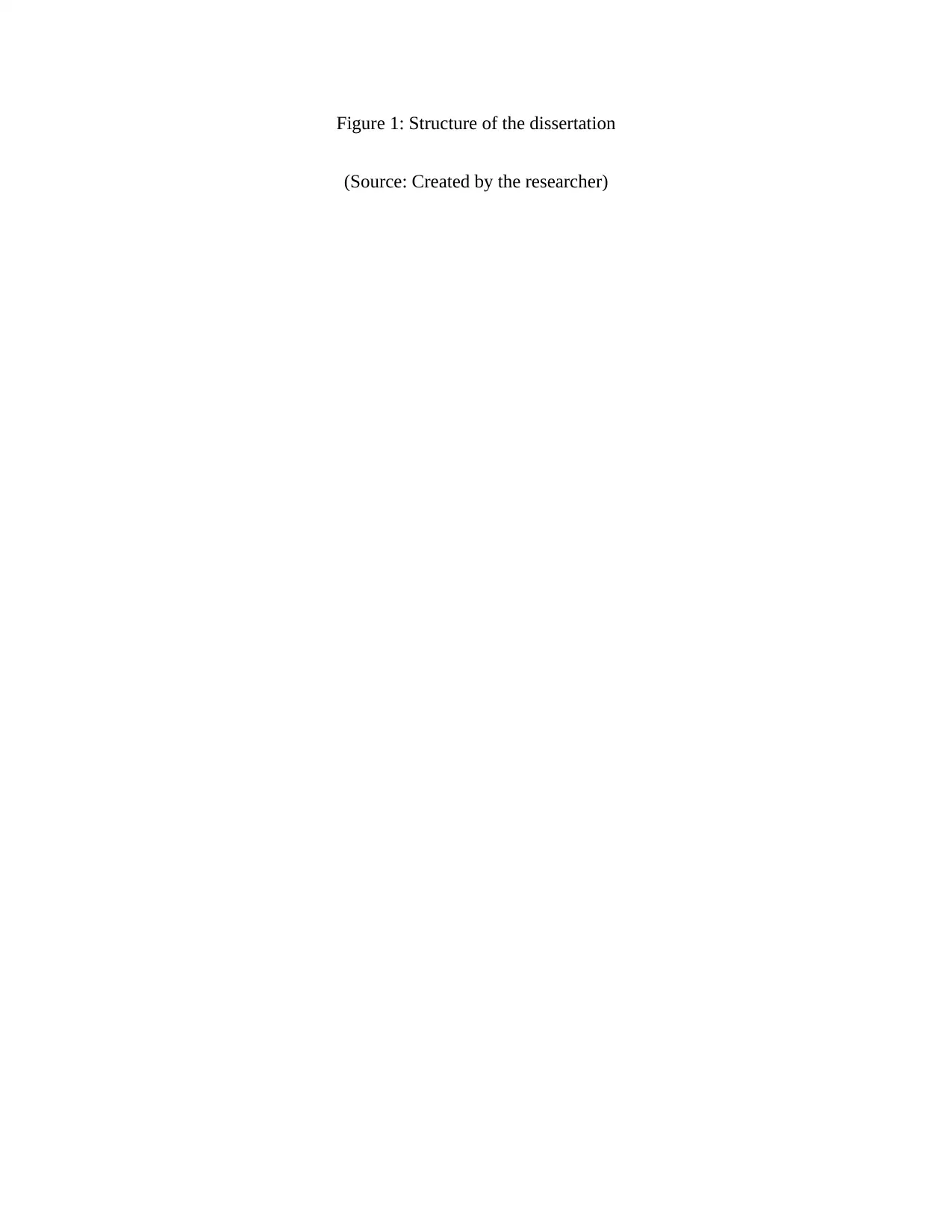
Figure 1: Structure of the dissertation
(Source: Created by the researcher)
(Source: Created by the researcher)
Paraphrase This Document
Need a fresh take? Get an instant paraphrase of this document with our AI Paraphraser
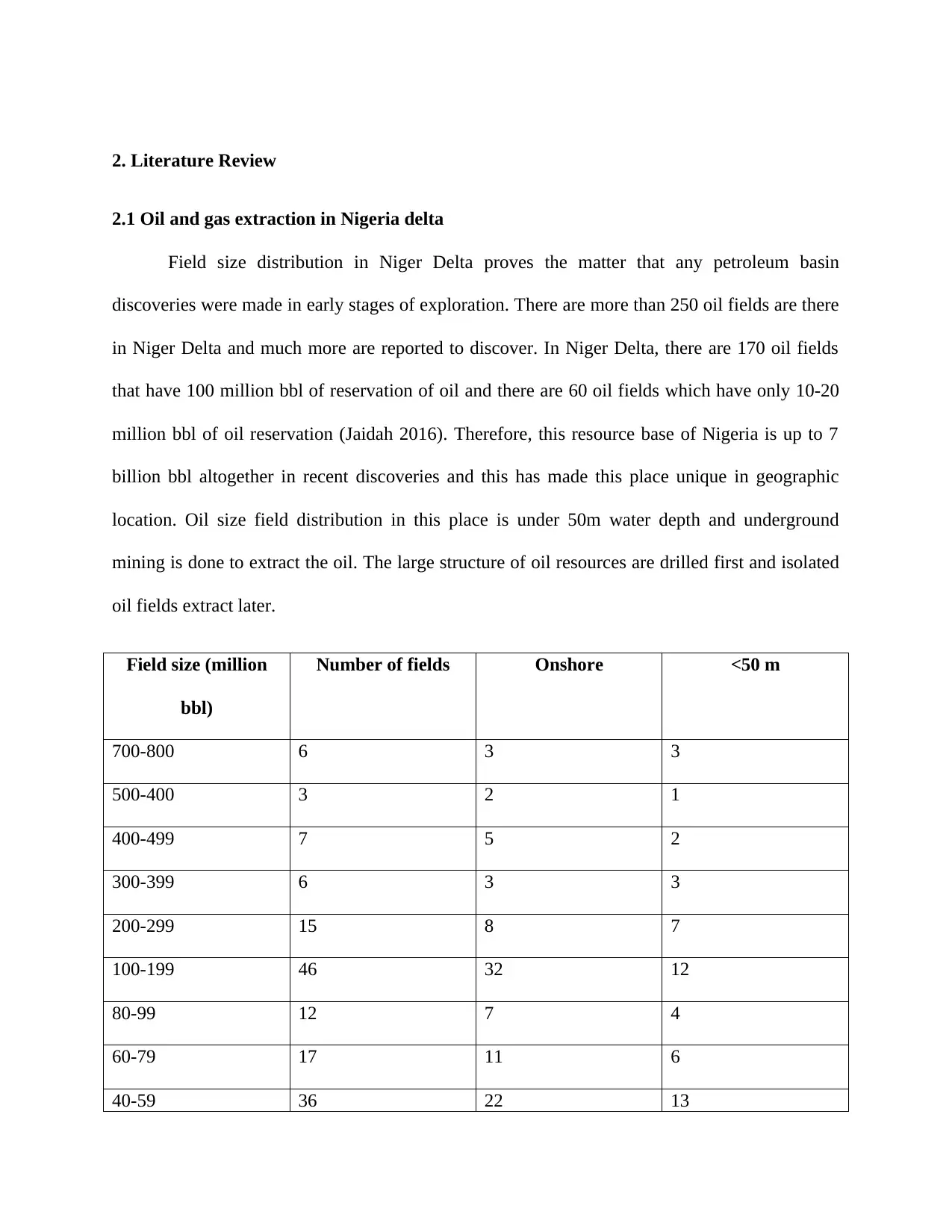
2. Literature Review
2.1 Oil and gas extraction in Nigeria delta
Field size distribution in Niger Delta proves the matter that any petroleum basin
discoveries were made in early stages of exploration. There are more than 250 oil fields are there
in Niger Delta and much more are reported to discover. In Niger Delta, there are 170 oil fields
that have 100 million bbl of reservation of oil and there are 60 oil fields which have only 10-20
million bbl of oil reservation (Jaidah 2016). Therefore, this resource base of Nigeria is up to 7
billion bbl altogether in recent discoveries and this has made this place unique in geographic
location. Oil size field distribution in this place is under 50m water depth and underground
mining is done to extract the oil. The large structure of oil resources are drilled first and isolated
oil fields extract later.
Field size (million
bbl)
Number of fields Onshore <50 m
700-800 6 3 3
500-400 3 2 1
400-499 7 5 2
300-399 6 3 3
200-299 15 8 7
100-199 46 32 12
80-99 12 7 4
60-79 17 11 6
40-59 36 22 13
2.1 Oil and gas extraction in Nigeria delta
Field size distribution in Niger Delta proves the matter that any petroleum basin
discoveries were made in early stages of exploration. There are more than 250 oil fields are there
in Niger Delta and much more are reported to discover. In Niger Delta, there are 170 oil fields
that have 100 million bbl of reservation of oil and there are 60 oil fields which have only 10-20
million bbl of oil reservation (Jaidah 2016). Therefore, this resource base of Nigeria is up to 7
billion bbl altogether in recent discoveries and this has made this place unique in geographic
location. Oil size field distribution in this place is under 50m water depth and underground
mining is done to extract the oil. The large structure of oil resources are drilled first and isolated
oil fields extract later.
Field size (million
bbl)
Number of fields Onshore <50 m
700-800 6 3 3
500-400 3 2 1
400-499 7 5 2
300-399 6 3 3
200-299 15 8 7
100-199 46 32 12
80-99 12 7 4
60-79 17 11 6
40-59 36 22 13
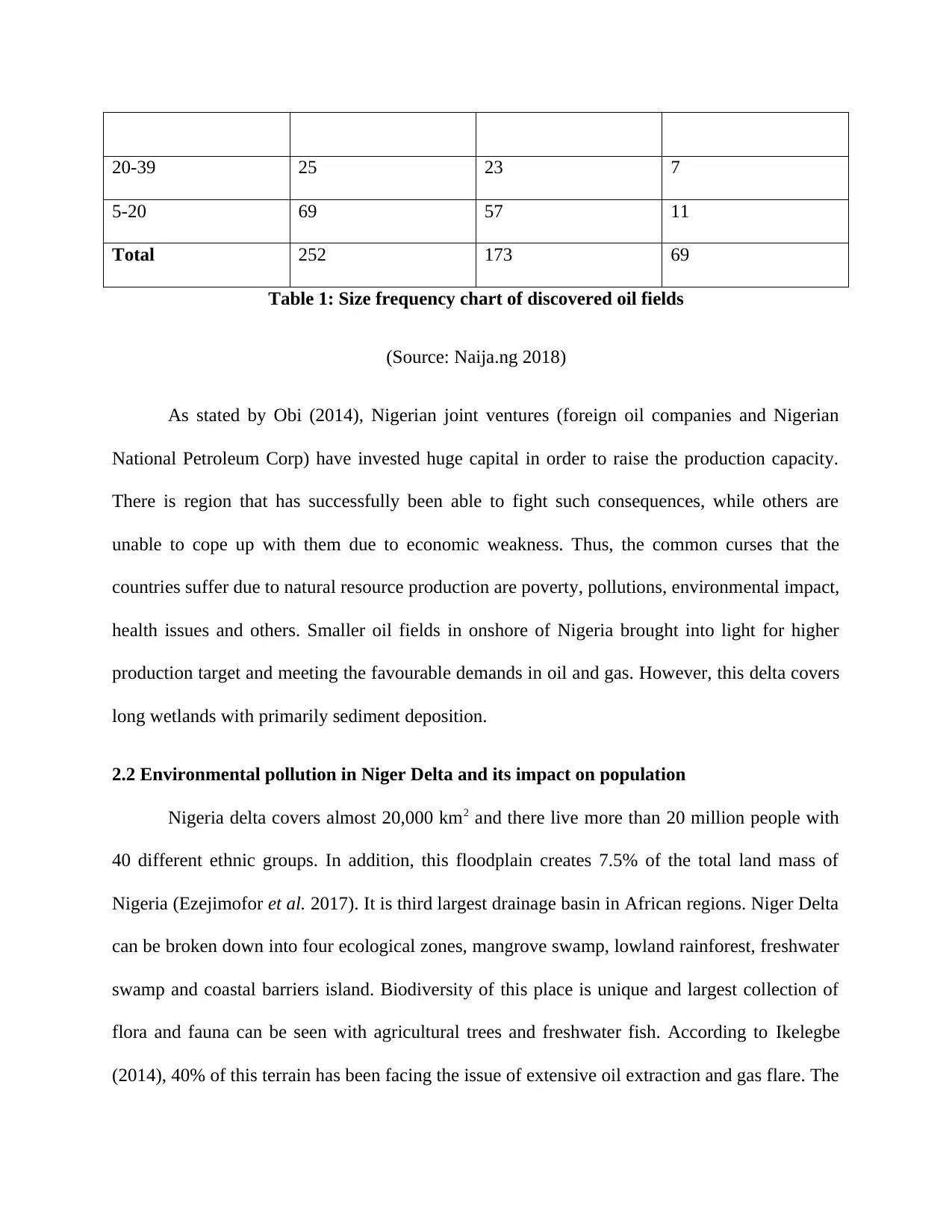
20-39 25 23 7
5-20 69 57 11
Total 252 173 69
Table 1: Size frequency chart of discovered oil fields
(Source: Naija.ng 2018)
As stated by Obi (2014), Nigerian joint ventures (foreign oil companies and Nigerian
National Petroleum Corp) have invested huge capital in order to raise the production capacity.
There is region that has successfully been able to fight such consequences, while others are
unable to cope up with them due to economic weakness. Thus, the common curses that the
countries suffer due to natural resource production are poverty, pollutions, environmental impact,
health issues and others. Smaller oil fields in onshore of Nigeria brought into light for higher
production target and meeting the favourable demands in oil and gas. However, this delta covers
long wetlands with primarily sediment deposition.
2.2 Environmental pollution in Niger Delta and its impact on population
Nigeria delta covers almost 20,000 km2 and there live more than 20 million people with
40 different ethnic groups. In addition, this floodplain creates 7.5% of the total land mass of
Nigeria (Ezejimofor et al. 2017). It is third largest drainage basin in African regions. Niger Delta
can be broken down into four ecological zones, mangrove swamp, lowland rainforest, freshwater
swamp and coastal barriers island. Biodiversity of this place is unique and largest collection of
flora and fauna can be seen with agricultural trees and freshwater fish. According to Ikelegbe
(2014), 40% of this terrain has been facing the issue of extensive oil extraction and gas flare. The
5-20 69 57 11
Total 252 173 69
Table 1: Size frequency chart of discovered oil fields
(Source: Naija.ng 2018)
As stated by Obi (2014), Nigerian joint ventures (foreign oil companies and Nigerian
National Petroleum Corp) have invested huge capital in order to raise the production capacity.
There is region that has successfully been able to fight such consequences, while others are
unable to cope up with them due to economic weakness. Thus, the common curses that the
countries suffer due to natural resource production are poverty, pollutions, environmental impact,
health issues and others. Smaller oil fields in onshore of Nigeria brought into light for higher
production target and meeting the favourable demands in oil and gas. However, this delta covers
long wetlands with primarily sediment deposition.
2.2 Environmental pollution in Niger Delta and its impact on population
Nigeria delta covers almost 20,000 km2 and there live more than 20 million people with
40 different ethnic groups. In addition, this floodplain creates 7.5% of the total land mass of
Nigeria (Ezejimofor et al. 2017). It is third largest drainage basin in African regions. Niger Delta
can be broken down into four ecological zones, mangrove swamp, lowland rainforest, freshwater
swamp and coastal barriers island. Biodiversity of this place is unique and largest collection of
flora and fauna can be seen with agricultural trees and freshwater fish. According to Ikelegbe
(2014), 40% of this terrain has been facing the issue of extensive oil extraction and gas flare. The
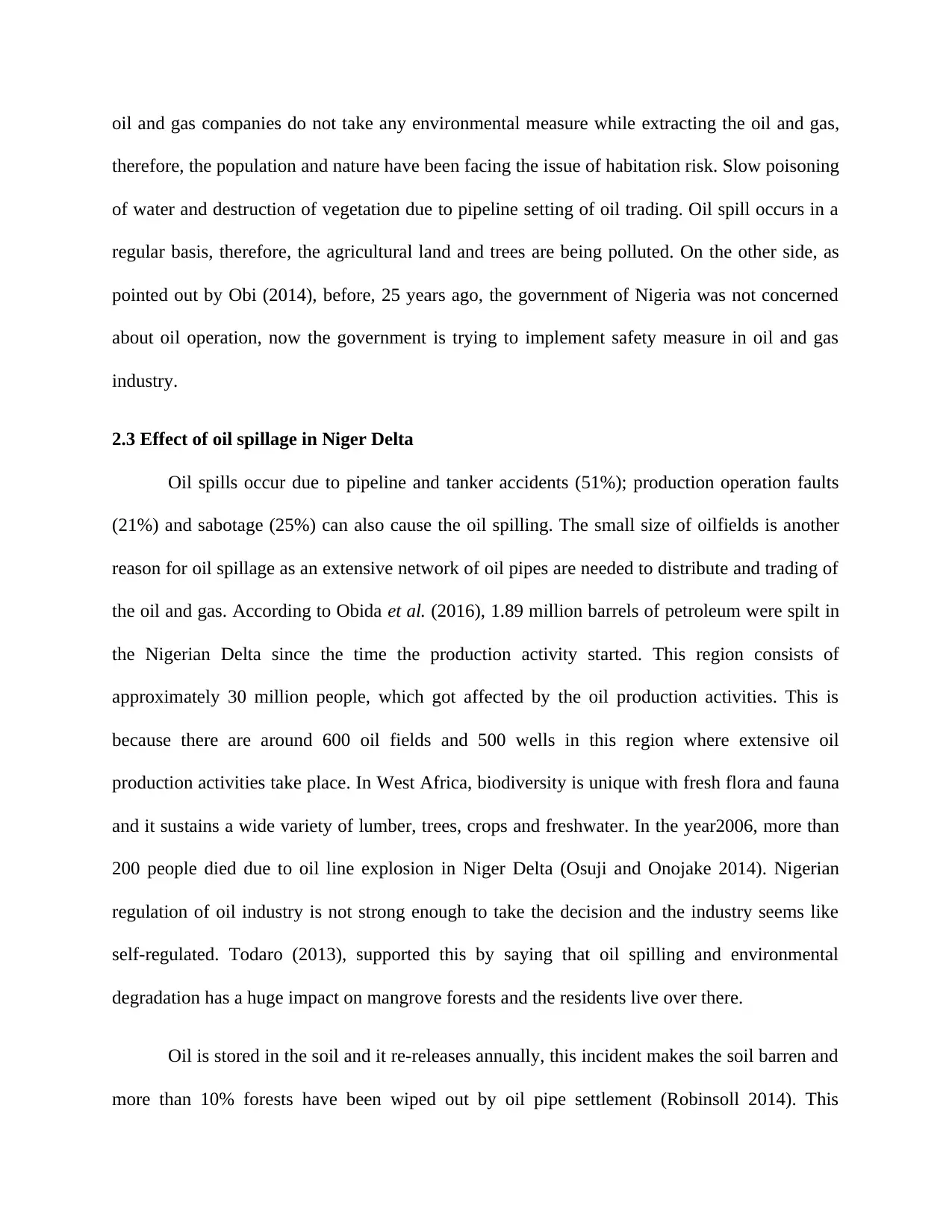
oil and gas companies do not take any environmental measure while extracting the oil and gas,
therefore, the population and nature have been facing the issue of habitation risk. Slow poisoning
of water and destruction of vegetation due to pipeline setting of oil trading. Oil spill occurs in a
regular basis, therefore, the agricultural land and trees are being polluted. On the other side, as
pointed out by Obi (2014), before, 25 years ago, the government of Nigeria was not concerned
about oil operation, now the government is trying to implement safety measure in oil and gas
industry.
2.3 Effect of oil spillage in Niger Delta
Oil spills occur due to pipeline and tanker accidents (51%); production operation faults
(21%) and sabotage (25%) can also cause the oil spilling. The small size of oilfields is another
reason for oil spillage as an extensive network of oil pipes are needed to distribute and trading of
the oil and gas. According to Obida et al. (2016), 1.89 million barrels of petroleum were spilt in
the Nigerian Delta since the time the production activity started. This region consists of
approximately 30 million people, which got affected by the oil production activities. This is
because there are around 600 oil fields and 500 wells in this region where extensive oil
production activities take place. In West Africa, biodiversity is unique with fresh flora and fauna
and it sustains a wide variety of lumber, trees, crops and freshwater. In the year2006, more than
200 people died due to oil line explosion in Niger Delta (Osuji and Onojake 2014). Nigerian
regulation of oil industry is not strong enough to take the decision and the industry seems like
self-regulated. Todaro (2013), supported this by saying that oil spilling and environmental
degradation has a huge impact on mangrove forests and the residents live over there.
Oil is stored in the soil and it re-releases annually, this incident makes the soil barren and
more than 10% forests have been wiped out by oil pipe settlement (Robinsoll 2014). This
therefore, the population and nature have been facing the issue of habitation risk. Slow poisoning
of water and destruction of vegetation due to pipeline setting of oil trading. Oil spill occurs in a
regular basis, therefore, the agricultural land and trees are being polluted. On the other side, as
pointed out by Obi (2014), before, 25 years ago, the government of Nigeria was not concerned
about oil operation, now the government is trying to implement safety measure in oil and gas
industry.
2.3 Effect of oil spillage in Niger Delta
Oil spills occur due to pipeline and tanker accidents (51%); production operation faults
(21%) and sabotage (25%) can also cause the oil spilling. The small size of oilfields is another
reason for oil spillage as an extensive network of oil pipes are needed to distribute and trading of
the oil and gas. According to Obida et al. (2016), 1.89 million barrels of petroleum were spilt in
the Nigerian Delta since the time the production activity started. This region consists of
approximately 30 million people, which got affected by the oil production activities. This is
because there are around 600 oil fields and 500 wells in this region where extensive oil
production activities take place. In West Africa, biodiversity is unique with fresh flora and fauna
and it sustains a wide variety of lumber, trees, crops and freshwater. In the year2006, more than
200 people died due to oil line explosion in Niger Delta (Osuji and Onojake 2014). Nigerian
regulation of oil industry is not strong enough to take the decision and the industry seems like
self-regulated. Todaro (2013), supported this by saying that oil spilling and environmental
degradation has a huge impact on mangrove forests and the residents live over there.
Oil is stored in the soil and it re-releases annually, this incident makes the soil barren and
more than 10% forests have been wiped out by oil pipe settlement (Robinsoll 2014). This
Secure Best Marks with AI Grader
Need help grading? Try our AI Grader for instant feedback on your assignments.
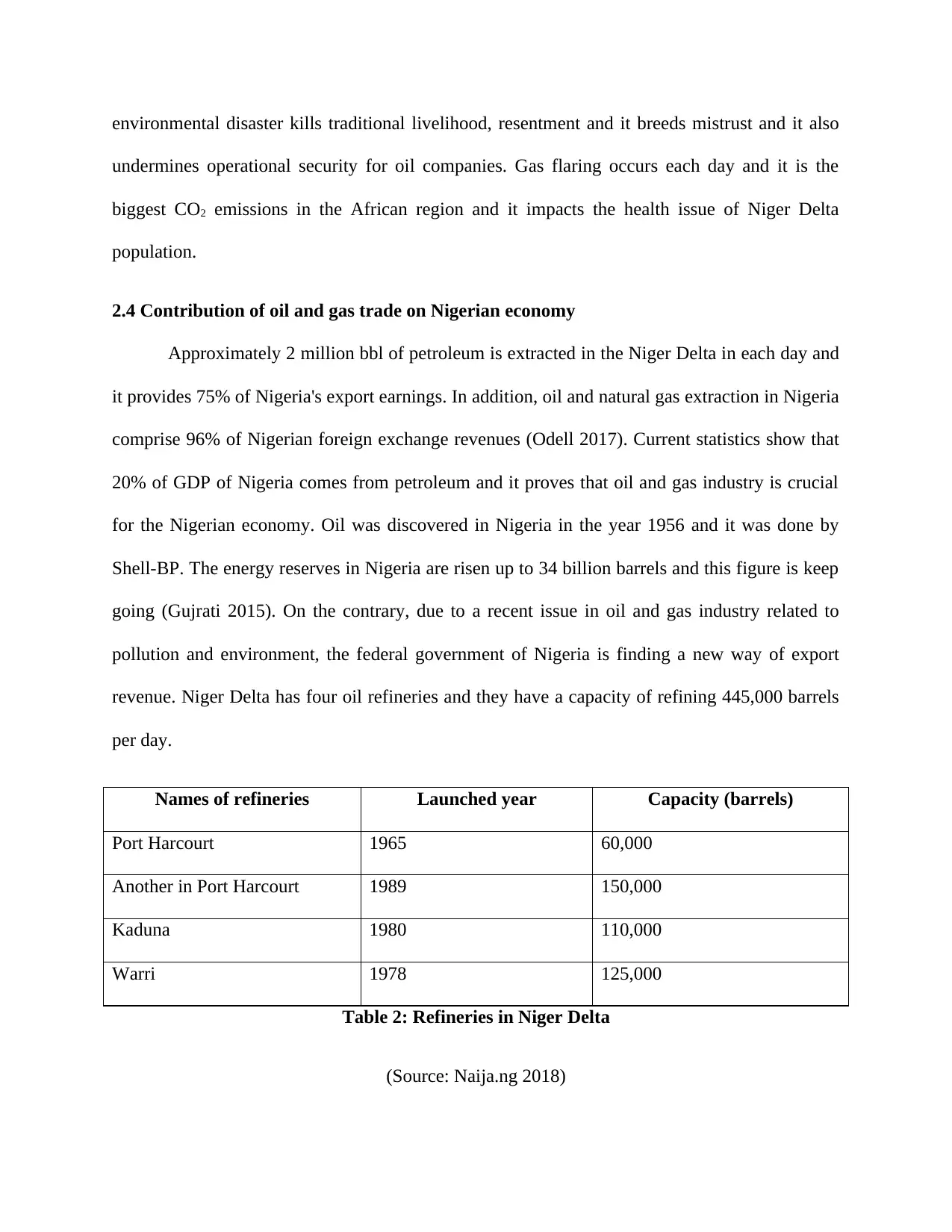
environmental disaster kills traditional livelihood, resentment and it breeds mistrust and it also
undermines operational security for oil companies. Gas flaring occurs each day and it is the
biggest CO2 emissions in the African region and it impacts the health issue of Niger Delta
population.
2.4 Contribution of oil and gas trade on Nigerian economy
Approximately 2 million bbl of petroleum is extracted in the Niger Delta in each day and
it provides 75% of Nigeria's export earnings. In addition, oil and natural gas extraction in Nigeria
comprise 96% of Nigerian foreign exchange revenues (Odell 2017). Current statistics show that
20% of GDP of Nigeria comes from petroleum and it proves that oil and gas industry is crucial
for the Nigerian economy. Oil was discovered in Nigeria in the year 1956 and it was done by
Shell-BP. The energy reserves in Nigeria are risen up to 34 billion barrels and this figure is keep
going (Gujrati 2015). On the contrary, due to a recent issue in oil and gas industry related to
pollution and environment, the federal government of Nigeria is finding a new way of export
revenue. Niger Delta has four oil refineries and they have a capacity of refining 445,000 barrels
per day.
Names of refineries Launched year Capacity (barrels)
Port Harcourt 1965 60,000
Another in Port Harcourt 1989 150,000
Kaduna 1980 110,000
Warri 1978 125,000
Table 2: Refineries in Niger Delta
(Source: Naija.ng 2018)
undermines operational security for oil companies. Gas flaring occurs each day and it is the
biggest CO2 emissions in the African region and it impacts the health issue of Niger Delta
population.
2.4 Contribution of oil and gas trade on Nigerian economy
Approximately 2 million bbl of petroleum is extracted in the Niger Delta in each day and
it provides 75% of Nigeria's export earnings. In addition, oil and natural gas extraction in Nigeria
comprise 96% of Nigerian foreign exchange revenues (Odell 2017). Current statistics show that
20% of GDP of Nigeria comes from petroleum and it proves that oil and gas industry is crucial
for the Nigerian economy. Oil was discovered in Nigeria in the year 1956 and it was done by
Shell-BP. The energy reserves in Nigeria are risen up to 34 billion barrels and this figure is keep
going (Gujrati 2015). On the contrary, due to a recent issue in oil and gas industry related to
pollution and environment, the federal government of Nigeria is finding a new way of export
revenue. Niger Delta has four oil refineries and they have a capacity of refining 445,000 barrels
per day.
Names of refineries Launched year Capacity (barrels)
Port Harcourt 1965 60,000
Another in Port Harcourt 1989 150,000
Kaduna 1980 110,000
Warri 1978 125,000
Table 2: Refineries in Niger Delta
(Source: Naija.ng 2018)
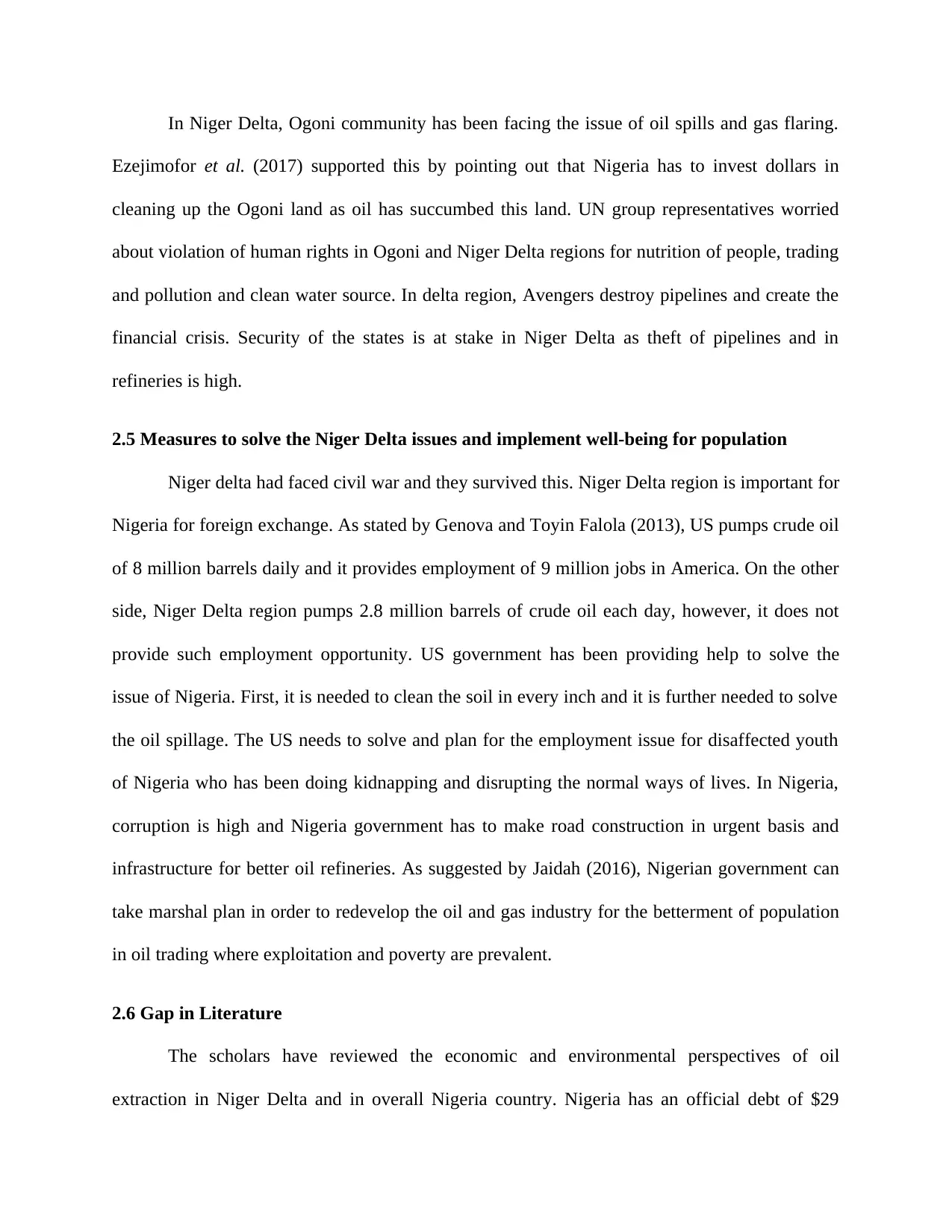
In Niger Delta, Ogoni community has been facing the issue of oil spills and gas flaring.
Ezejimofor et al. (2017) supported this by pointing out that Nigeria has to invest dollars in
cleaning up the Ogoni land as oil has succumbed this land. UN group representatives worried
about violation of human rights in Ogoni and Niger Delta regions for nutrition of people, trading
and pollution and clean water source. In delta region, Avengers destroy pipelines and create the
financial crisis. Security of the states is at stake in Niger Delta as theft of pipelines and in
refineries is high.
2.5 Measures to solve the Niger Delta issues and implement well-being for population
Niger delta had faced civil war and they survived this. Niger Delta region is important for
Nigeria for foreign exchange. As stated by Genova and Toyin Falola (2013), US pumps crude oil
of 8 million barrels daily and it provides employment of 9 million jobs in America. On the other
side, Niger Delta region pumps 2.8 million barrels of crude oil each day, however, it does not
provide such employment opportunity. US government has been providing help to solve the
issue of Nigeria. First, it is needed to clean the soil in every inch and it is further needed to solve
the oil spillage. The US needs to solve and plan for the employment issue for disaffected youth
of Nigeria who has been doing kidnapping and disrupting the normal ways of lives. In Nigeria,
corruption is high and Nigeria government has to make road construction in urgent basis and
infrastructure for better oil refineries. As suggested by Jaidah (2016), Nigerian government can
take marshal plan in order to redevelop the oil and gas industry for the betterment of population
in oil trading where exploitation and poverty are prevalent.
2.6 Gap in Literature
The scholars have reviewed the economic and environmental perspectives of oil
extraction in Niger Delta and in overall Nigeria country. Nigeria has an official debt of $29
Ezejimofor et al. (2017) supported this by pointing out that Nigeria has to invest dollars in
cleaning up the Ogoni land as oil has succumbed this land. UN group representatives worried
about violation of human rights in Ogoni and Niger Delta regions for nutrition of people, trading
and pollution and clean water source. In delta region, Avengers destroy pipelines and create the
financial crisis. Security of the states is at stake in Niger Delta as theft of pipelines and in
refineries is high.
2.5 Measures to solve the Niger Delta issues and implement well-being for population
Niger delta had faced civil war and they survived this. Niger Delta region is important for
Nigeria for foreign exchange. As stated by Genova and Toyin Falola (2013), US pumps crude oil
of 8 million barrels daily and it provides employment of 9 million jobs in America. On the other
side, Niger Delta region pumps 2.8 million barrels of crude oil each day, however, it does not
provide such employment opportunity. US government has been providing help to solve the
issue of Nigeria. First, it is needed to clean the soil in every inch and it is further needed to solve
the oil spillage. The US needs to solve and plan for the employment issue for disaffected youth
of Nigeria who has been doing kidnapping and disrupting the normal ways of lives. In Nigeria,
corruption is high and Nigeria government has to make road construction in urgent basis and
infrastructure for better oil refineries. As suggested by Jaidah (2016), Nigerian government can
take marshal plan in order to redevelop the oil and gas industry for the betterment of population
in oil trading where exploitation and poverty are prevalent.
2.6 Gap in Literature
The scholars have reviewed the economic and environmental perspectives of oil
extraction in Niger Delta and in overall Nigeria country. Nigeria has an official debt of $29
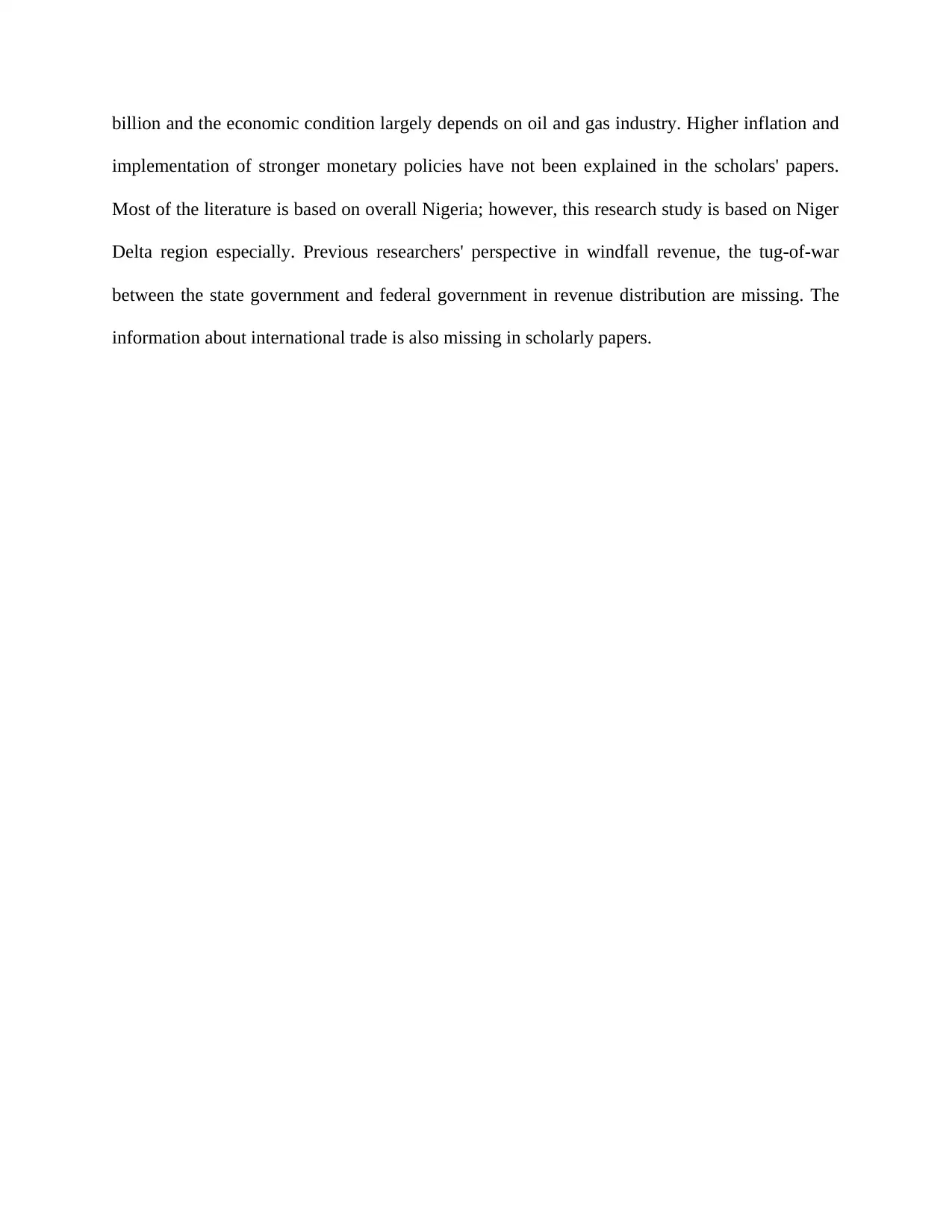
billion and the economic condition largely depends on oil and gas industry. Higher inflation and
implementation of stronger monetary policies have not been explained in the scholars' papers.
Most of the literature is based on overall Nigeria; however, this research study is based on Niger
Delta region especially. Previous researchers' perspective in windfall revenue, the tug-of-war
between the state government and federal government in revenue distribution are missing. The
information about international trade is also missing in scholarly papers.
implementation of stronger monetary policies have not been explained in the scholars' papers.
Most of the literature is based on overall Nigeria; however, this research study is based on Niger
Delta region especially. Previous researchers' perspective in windfall revenue, the tug-of-war
between the state government and federal government in revenue distribution are missing. The
information about international trade is also missing in scholarly papers.
Paraphrase This Document
Need a fresh take? Get an instant paraphrase of this document with our AI Paraphraser
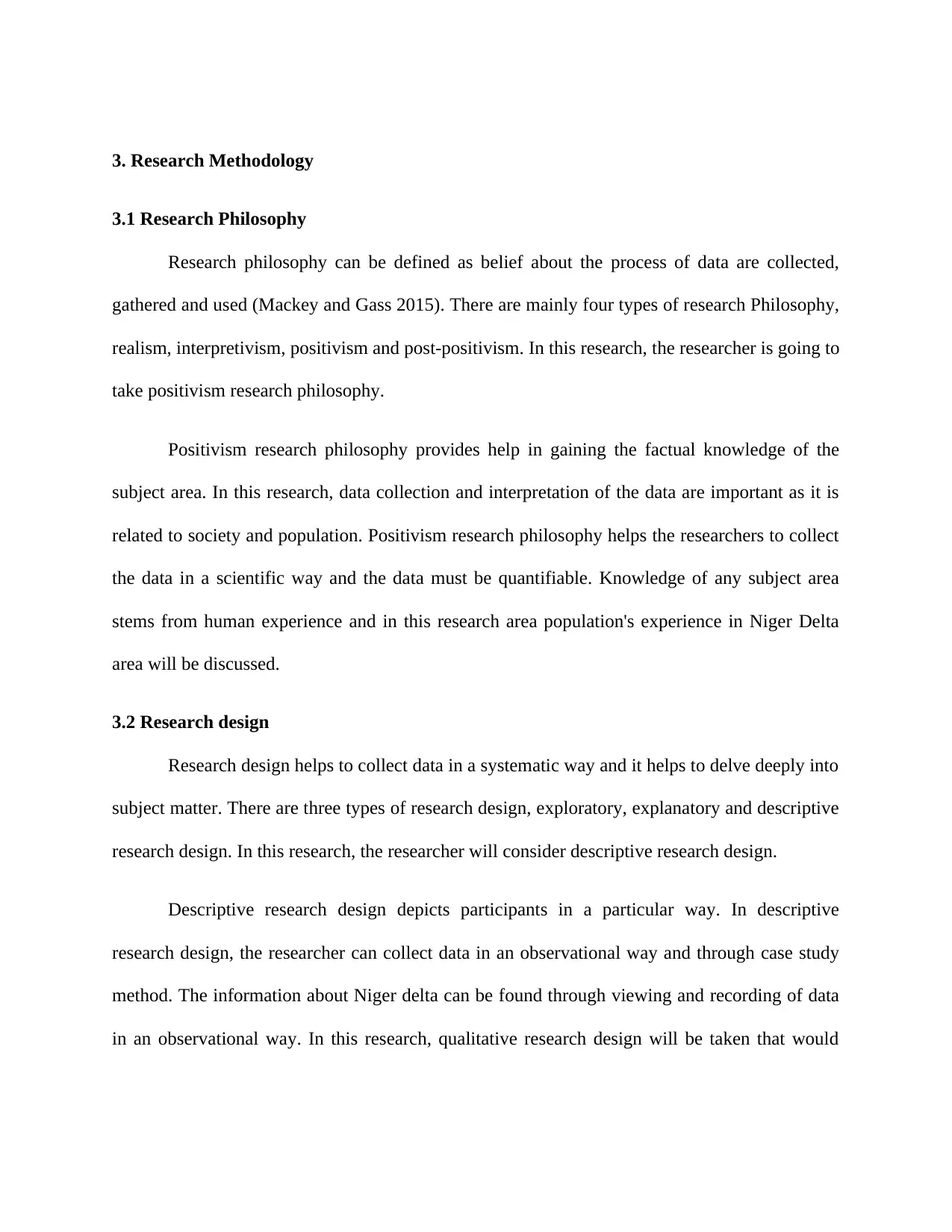
3. Research Methodology
3.1 Research Philosophy
Research philosophy can be defined as belief about the process of data are collected,
gathered and used (Mackey and Gass 2015). There are mainly four types of research Philosophy,
realism, interpretivism, positivism and post-positivism. In this research, the researcher is going to
take positivism research philosophy.
Positivism research philosophy provides help in gaining the factual knowledge of the
subject area. In this research, data collection and interpretation of the data are important as it is
related to society and population. Positivism research philosophy helps the researchers to collect
the data in a scientific way and the data must be quantifiable. Knowledge of any subject area
stems from human experience and in this research area population's experience in Niger Delta
area will be discussed.
3.2 Research design
Research design helps to collect data in a systematic way and it helps to delve deeply into
subject matter. There are three types of research design, exploratory, explanatory and descriptive
research design. In this research, the researcher will consider descriptive research design.
Descriptive research design depicts participants in a particular way. In descriptive
research design, the researcher can collect data in an observational way and through case study
method. The information about Niger delta can be found through viewing and recording of data
in an observational way. In this research, qualitative research design will be taken that would
3.1 Research Philosophy
Research philosophy can be defined as belief about the process of data are collected,
gathered and used (Mackey and Gass 2015). There are mainly four types of research Philosophy,
realism, interpretivism, positivism and post-positivism. In this research, the researcher is going to
take positivism research philosophy.
Positivism research philosophy provides help in gaining the factual knowledge of the
subject area. In this research, data collection and interpretation of the data are important as it is
related to society and population. Positivism research philosophy helps the researchers to collect
the data in a scientific way and the data must be quantifiable. Knowledge of any subject area
stems from human experience and in this research area population's experience in Niger Delta
area will be discussed.
3.2 Research design
Research design helps to collect data in a systematic way and it helps to delve deeply into
subject matter. There are three types of research design, exploratory, explanatory and descriptive
research design. In this research, the researcher will consider descriptive research design.
Descriptive research design depicts participants in a particular way. In descriptive
research design, the researcher can collect data in an observational way and through case study
method. The information about Niger delta can be found through viewing and recording of data
in an observational way. In this research, qualitative research design will be taken that would
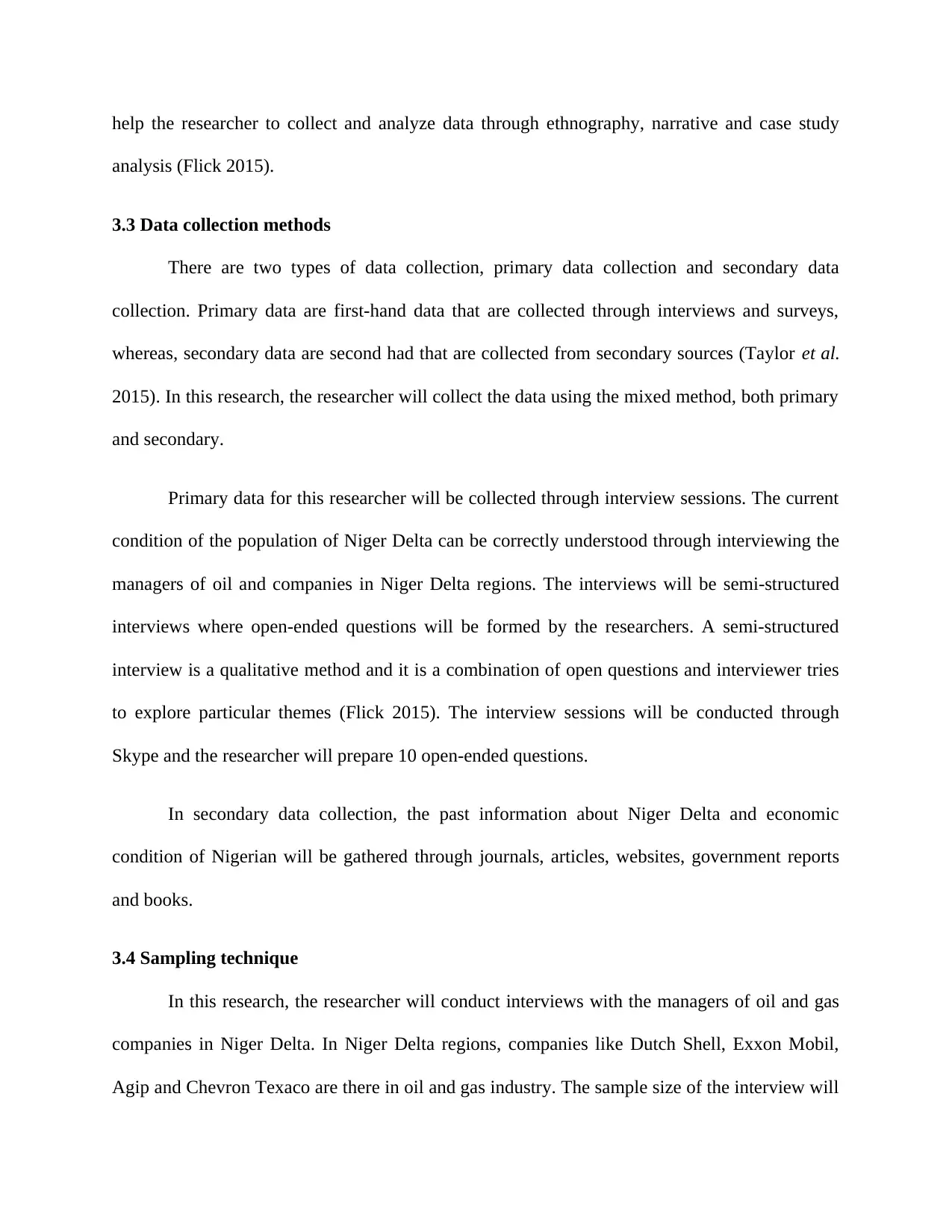
help the researcher to collect and analyze data through ethnography, narrative and case study
analysis (Flick 2015).
3.3 Data collection methods
There are two types of data collection, primary data collection and secondary data
collection. Primary data are first-hand data that are collected through interviews and surveys,
whereas, secondary data are second had that are collected from secondary sources (Taylor et al.
2015). In this research, the researcher will collect the data using the mixed method, both primary
and secondary.
Primary data for this researcher will be collected through interview sessions. The current
condition of the population of Niger Delta can be correctly understood through interviewing the
managers of oil and companies in Niger Delta regions. The interviews will be semi-structured
interviews where open-ended questions will be formed by the researchers. A semi-structured
interview is a qualitative method and it is a combination of open questions and interviewer tries
to explore particular themes (Flick 2015). The interview sessions will be conducted through
Skype and the researcher will prepare 10 open-ended questions.
In secondary data collection, the past information about Niger Delta and economic
condition of Nigerian will be gathered through journals, articles, websites, government reports
and books.
3.4 Sampling technique
In this research, the researcher will conduct interviews with the managers of oil and gas
companies in Niger Delta. In Niger Delta regions, companies like Dutch Shell, Exxon Mobil,
Agip and Chevron Texaco are there in oil and gas industry. The sample size of the interview will
analysis (Flick 2015).
3.3 Data collection methods
There are two types of data collection, primary data collection and secondary data
collection. Primary data are first-hand data that are collected through interviews and surveys,
whereas, secondary data are second had that are collected from secondary sources (Taylor et al.
2015). In this research, the researcher will collect the data using the mixed method, both primary
and secondary.
Primary data for this researcher will be collected through interview sessions. The current
condition of the population of Niger Delta can be correctly understood through interviewing the
managers of oil and companies in Niger Delta regions. The interviews will be semi-structured
interviews where open-ended questions will be formed by the researchers. A semi-structured
interview is a qualitative method and it is a combination of open questions and interviewer tries
to explore particular themes (Flick 2015). The interview sessions will be conducted through
Skype and the researcher will prepare 10 open-ended questions.
In secondary data collection, the past information about Niger Delta and economic
condition of Nigerian will be gathered through journals, articles, websites, government reports
and books.
3.4 Sampling technique
In this research, the researcher will conduct interviews with the managers of oil and gas
companies in Niger Delta. In Niger Delta regions, companies like Dutch Shell, Exxon Mobil,
Agip and Chevron Texaco are there in oil and gas industry. The sample size of the interview will
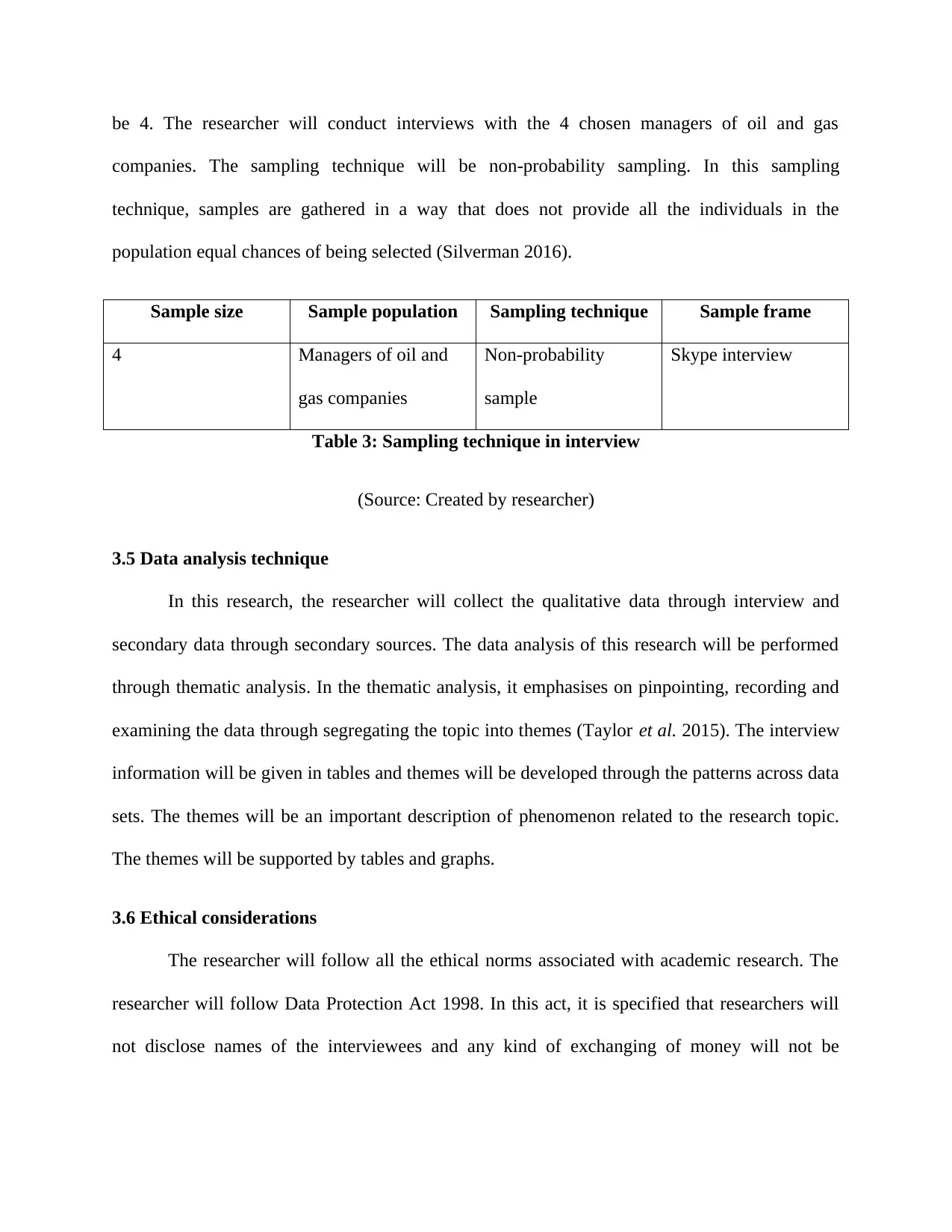
be 4. The researcher will conduct interviews with the 4 chosen managers of oil and gas
companies. The sampling technique will be non-probability sampling. In this sampling
technique, samples are gathered in a way that does not provide all the individuals in the
population equal chances of being selected (Silverman 2016).
Sample size Sample population Sampling technique Sample frame
4 Managers of oil and
gas companies
Non-probability
sample
Skype interview
Table 3: Sampling technique in interview
(Source: Created by researcher)
3.5 Data analysis technique
In this research, the researcher will collect the qualitative data through interview and
secondary data through secondary sources. The data analysis of this research will be performed
through thematic analysis. In the thematic analysis, it emphasises on pinpointing, recording and
examining the data through segregating the topic into themes (Taylor et al. 2015). The interview
information will be given in tables and themes will be developed through the patterns across data
sets. The themes will be an important description of phenomenon related to the research topic.
The themes will be supported by tables and graphs.
3.6 Ethical considerations
The researcher will follow all the ethical norms associated with academic research. The
researcher will follow Data Protection Act 1998. In this act, it is specified that researchers will
not disclose names of the interviewees and any kind of exchanging of money will not be
companies. The sampling technique will be non-probability sampling. In this sampling
technique, samples are gathered in a way that does not provide all the individuals in the
population equal chances of being selected (Silverman 2016).
Sample size Sample population Sampling technique Sample frame
4 Managers of oil and
gas companies
Non-probability
sample
Skype interview
Table 3: Sampling technique in interview
(Source: Created by researcher)
3.5 Data analysis technique
In this research, the researcher will collect the qualitative data through interview and
secondary data through secondary sources. The data analysis of this research will be performed
through thematic analysis. In the thematic analysis, it emphasises on pinpointing, recording and
examining the data through segregating the topic into themes (Taylor et al. 2015). The interview
information will be given in tables and themes will be developed through the patterns across data
sets. The themes will be an important description of phenomenon related to the research topic.
The themes will be supported by tables and graphs.
3.6 Ethical considerations
The researcher will follow all the ethical norms associated with academic research. The
researcher will follow Data Protection Act 1998. In this act, it is specified that researchers will
not disclose names of the interviewees and any kind of exchanging of money will not be
Secure Best Marks with AI Grader
Need help grading? Try our AI Grader for instant feedback on your assignments.
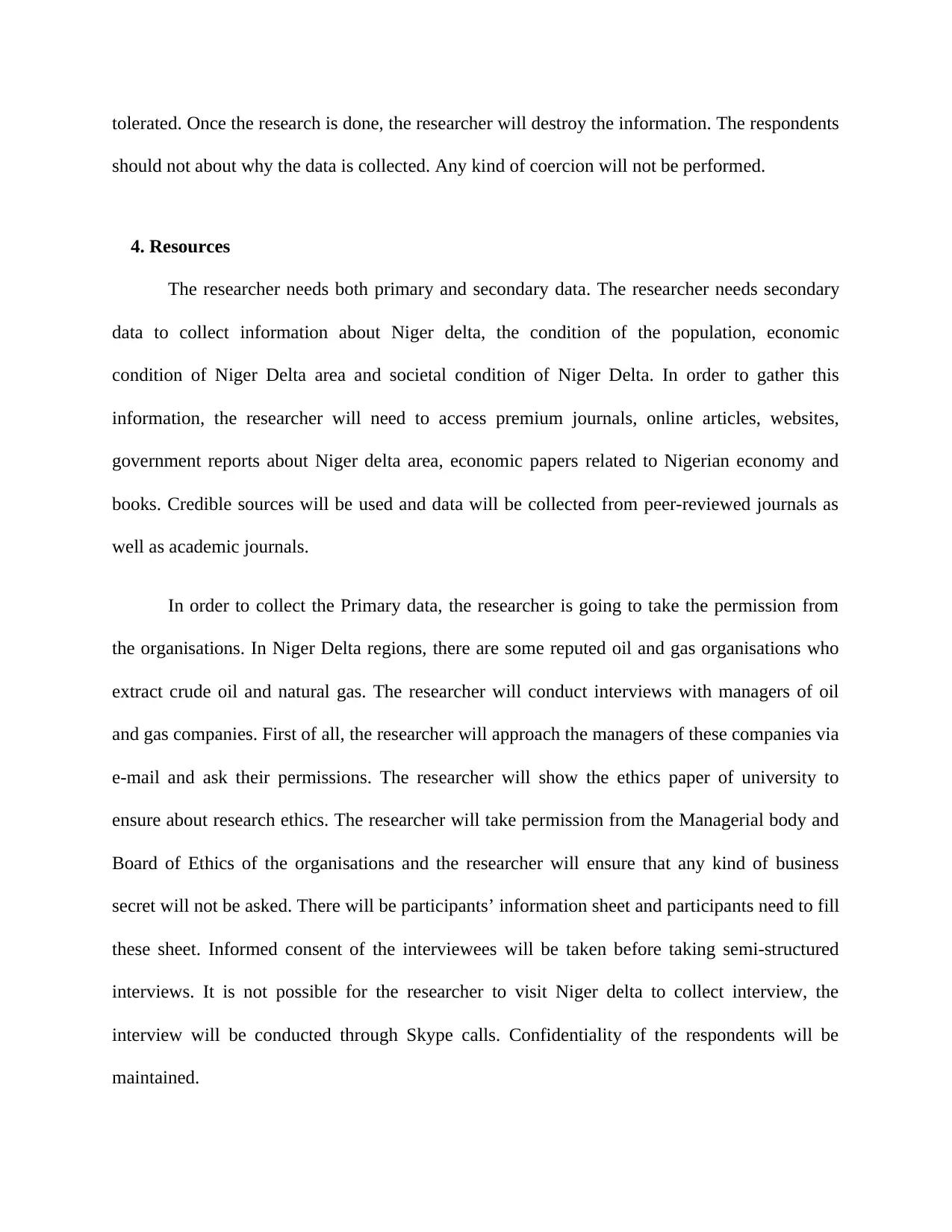
tolerated. Once the research is done, the researcher will destroy the information. The respondents
should not about why the data is collected. Any kind of coercion will not be performed.
4. Resources
The researcher needs both primary and secondary data. The researcher needs secondary
data to collect information about Niger delta, the condition of the population, economic
condition of Niger Delta area and societal condition of Niger Delta. In order to gather this
information, the researcher will need to access premium journals, online articles, websites,
government reports about Niger delta area, economic papers related to Nigerian economy and
books. Credible sources will be used and data will be collected from peer-reviewed journals as
well as academic journals.
In order to collect the Primary data, the researcher is going to take the permission from
the organisations. In Niger Delta regions, there are some reputed oil and gas organisations who
extract crude oil and natural gas. The researcher will conduct interviews with managers of oil
and gas companies. First of all, the researcher will approach the managers of these companies via
e-mail and ask their permissions. The researcher will show the ethics paper of university to
ensure about research ethics. The researcher will take permission from the Managerial body and
Board of Ethics of the organisations and the researcher will ensure that any kind of business
secret will not be asked. There will be participants’ information sheet and participants need to fill
these sheet. Informed consent of the interviewees will be taken before taking semi-structured
interviews. It is not possible for the researcher to visit Niger delta to collect interview, the
interview will be conducted through Skype calls. Confidentiality of the respondents will be
maintained.
should not about why the data is collected. Any kind of coercion will not be performed.
4. Resources
The researcher needs both primary and secondary data. The researcher needs secondary
data to collect information about Niger delta, the condition of the population, economic
condition of Niger Delta area and societal condition of Niger Delta. In order to gather this
information, the researcher will need to access premium journals, online articles, websites,
government reports about Niger delta area, economic papers related to Nigerian economy and
books. Credible sources will be used and data will be collected from peer-reviewed journals as
well as academic journals.
In order to collect the Primary data, the researcher is going to take the permission from
the organisations. In Niger Delta regions, there are some reputed oil and gas organisations who
extract crude oil and natural gas. The researcher will conduct interviews with managers of oil
and gas companies. First of all, the researcher will approach the managers of these companies via
e-mail and ask their permissions. The researcher will show the ethics paper of university to
ensure about research ethics. The researcher will take permission from the Managerial body and
Board of Ethics of the organisations and the researcher will ensure that any kind of business
secret will not be asked. There will be participants’ information sheet and participants need to fill
these sheet. Informed consent of the interviewees will be taken before taking semi-structured
interviews. It is not possible for the researcher to visit Niger delta to collect interview, the
interview will be conducted through Skype calls. Confidentiality of the respondents will be
maintained.

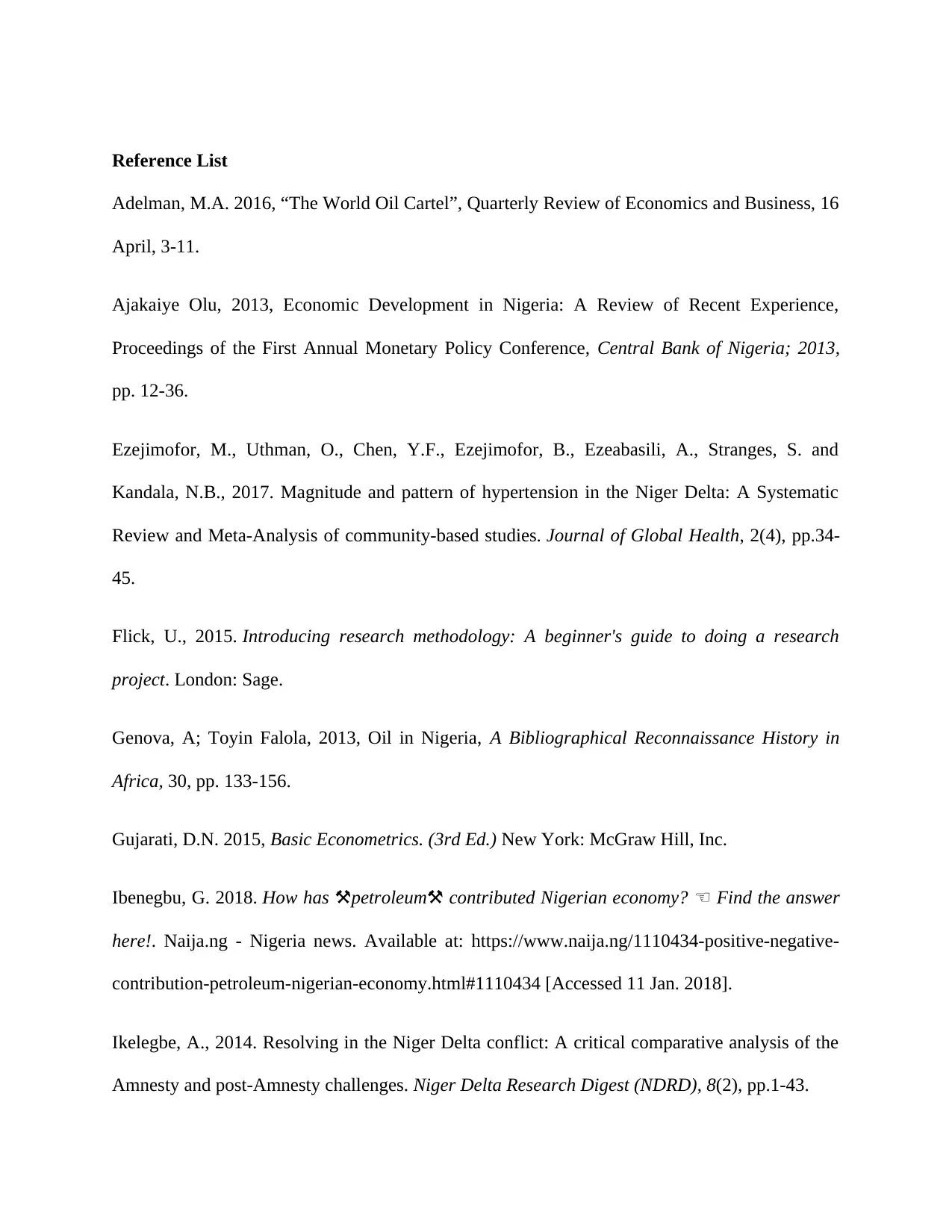
Reference List
Adelman, M.A. 2016, “The World Oil Cartel”, Quarterly Review of Economics and Business, 16
April, 3-11.
Ajakaiye Olu, 2013, Economic Development in Nigeria: A Review of Recent Experience,
Proceedings of the First Annual Monetary Policy Conference, Central Bank of Nigeria; 2013,
pp. 12-36.
Ezejimofor, M., Uthman, O., Chen, Y.F., Ezejimofor, B., Ezeabasili, A., Stranges, S. and
Kandala, N.B., 2017. Magnitude and pattern of hypertension in the Niger Delta: A Systematic
Review and Meta-Analysis of community-based studies. Journal of Global Health, 2(4), pp.34-
45.
Flick, U., 2015. Introducing research methodology: A beginner's guide to doing a research
project. London: Sage.
Genova, A; Toyin Falola, 2013, Oil in Nigeria, A Bibliographical Reconnaissance History in
Africa, 30, pp. 133-156.
Gujarati, D.N. 2015, Basic Econometrics. (3rd Ed.) New York: McGraw Hill, Inc.
Ibenegbu, G. 2018. How has petroleum contributed Nigerian economy?⚒ ⚒ ☜ Find the answer
here!. Naija.ng - Nigeria news. Available at: https://www.naija.ng/1110434-positive-negative-
contribution-petroleum-nigerian-economy.html#1110434 [Accessed 11 Jan. 2018].
Ikelegbe, A., 2014. Resolving in the Niger Delta conflict: A critical comparative analysis of the
Amnesty and post-Amnesty challenges. Niger Delta Research Digest (NDRD), 8(2), pp.1-43.
Adelman, M.A. 2016, “The World Oil Cartel”, Quarterly Review of Economics and Business, 16
April, 3-11.
Ajakaiye Olu, 2013, Economic Development in Nigeria: A Review of Recent Experience,
Proceedings of the First Annual Monetary Policy Conference, Central Bank of Nigeria; 2013,
pp. 12-36.
Ezejimofor, M., Uthman, O., Chen, Y.F., Ezejimofor, B., Ezeabasili, A., Stranges, S. and
Kandala, N.B., 2017. Magnitude and pattern of hypertension in the Niger Delta: A Systematic
Review and Meta-Analysis of community-based studies. Journal of Global Health, 2(4), pp.34-
45.
Flick, U., 2015. Introducing research methodology: A beginner's guide to doing a research
project. London: Sage.
Genova, A; Toyin Falola, 2013, Oil in Nigeria, A Bibliographical Reconnaissance History in
Africa, 30, pp. 133-156.
Gujarati, D.N. 2015, Basic Econometrics. (3rd Ed.) New York: McGraw Hill, Inc.
Ibenegbu, G. 2018. How has petroleum contributed Nigerian economy?⚒ ⚒ ☜ Find the answer
here!. Naija.ng - Nigeria news. Available at: https://www.naija.ng/1110434-positive-negative-
contribution-petroleum-nigerian-economy.html#1110434 [Accessed 11 Jan. 2018].
Ikelegbe, A., 2014. Resolving in the Niger Delta conflict: A critical comparative analysis of the
Amnesty and post-Amnesty challenges. Niger Delta Research Digest (NDRD), 8(2), pp.1-43.
Paraphrase This Document
Need a fresh take? Get an instant paraphrase of this document with our AI Paraphraser
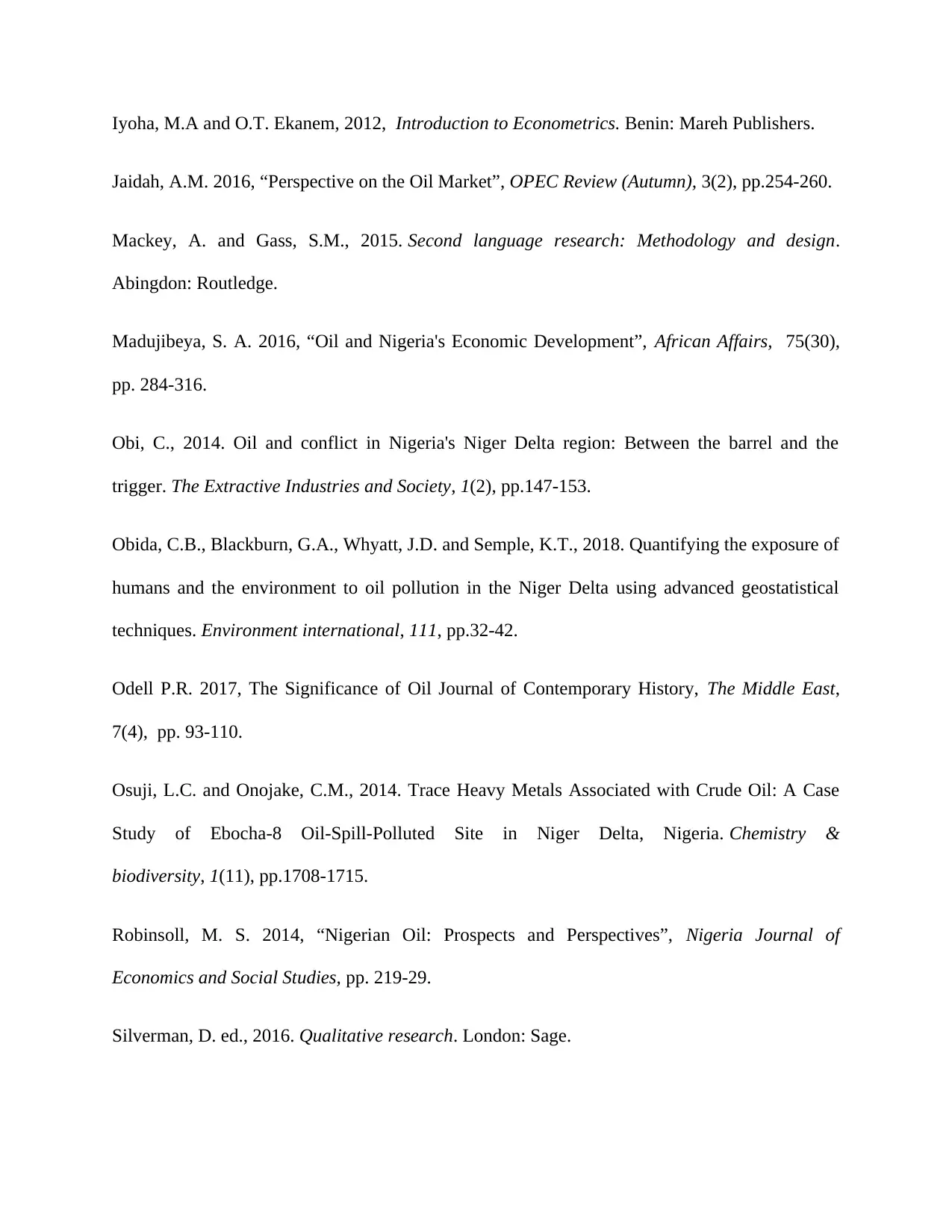
Iyoha, M.A and O.T. Ekanem, 2012, Introduction to Econometrics. Benin: Mareh Publishers.
Jaidah, A.M. 2016, “Perspective on the Oil Market”, OPEC Review (Autumn), 3(2), pp.254-260.
Mackey, A. and Gass, S.M., 2015. Second language research: Methodology and design.
Abingdon: Routledge.
Madujibeya, S. A. 2016, “Oil and Nigeria's Economic Development”, African Affairs, 75(30),
pp. 284-316.
Obi, C., 2014. Oil and conflict in Nigeria's Niger Delta region: Between the barrel and the
trigger. The Extractive Industries and Society, 1(2), pp.147-153.
Obida, C.B., Blackburn, G.A., Whyatt, J.D. and Semple, K.T., 2018. Quantifying the exposure of
humans and the environment to oil pollution in the Niger Delta using advanced geostatistical
techniques. Environment international, 111, pp.32-42.
Odell P.R. 2017, The Significance of Oil Journal of Contemporary History, The Middle East,
7(4), pp. 93-110.
Osuji, L.C. and Onojake, C.M., 2014. Trace Heavy Metals Associated with Crude Oil: A Case
Study of Ebocha‐8 Oil‐Spill‐Polluted Site in Niger Delta, Nigeria. Chemistry &
biodiversity, 1(11), pp.1708-1715.
Robinsoll, M. S. 2014, “Nigerian Oil: Prospects and Perspectives”, Nigeria Journal of
Economics and Social Studies, pp. 219-29.
Silverman, D. ed., 2016. Qualitative research. London: Sage.
Jaidah, A.M. 2016, “Perspective on the Oil Market”, OPEC Review (Autumn), 3(2), pp.254-260.
Mackey, A. and Gass, S.M., 2015. Second language research: Methodology and design.
Abingdon: Routledge.
Madujibeya, S. A. 2016, “Oil and Nigeria's Economic Development”, African Affairs, 75(30),
pp. 284-316.
Obi, C., 2014. Oil and conflict in Nigeria's Niger Delta region: Between the barrel and the
trigger. The Extractive Industries and Society, 1(2), pp.147-153.
Obida, C.B., Blackburn, G.A., Whyatt, J.D. and Semple, K.T., 2018. Quantifying the exposure of
humans and the environment to oil pollution in the Niger Delta using advanced geostatistical
techniques. Environment international, 111, pp.32-42.
Odell P.R. 2017, The Significance of Oil Journal of Contemporary History, The Middle East,
7(4), pp. 93-110.
Osuji, L.C. and Onojake, C.M., 2014. Trace Heavy Metals Associated with Crude Oil: A Case
Study of Ebocha‐8 Oil‐Spill‐Polluted Site in Niger Delta, Nigeria. Chemistry &
biodiversity, 1(11), pp.1708-1715.
Robinsoll, M. S. 2014, “Nigerian Oil: Prospects and Perspectives”, Nigeria Journal of
Economics and Social Studies, pp. 219-29.
Silverman, D. ed., 2016. Qualitative research. London: Sage.
1 out of 20
Related Documents
Your All-in-One AI-Powered Toolkit for Academic Success.
+13062052269
info@desklib.com
Available 24*7 on WhatsApp / Email
![[object Object]](/_next/static/media/star-bottom.7253800d.svg)
Unlock your academic potential
© 2024 | Zucol Services PVT LTD | All rights reserved.





